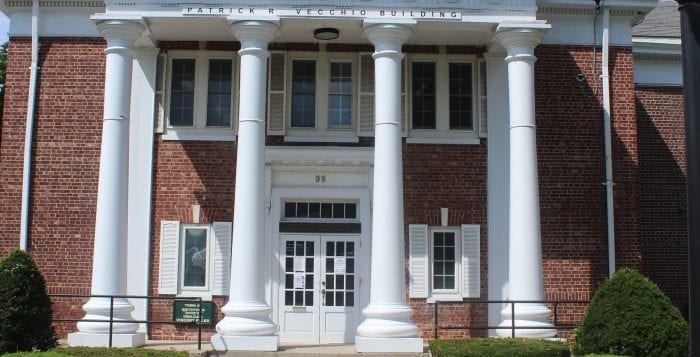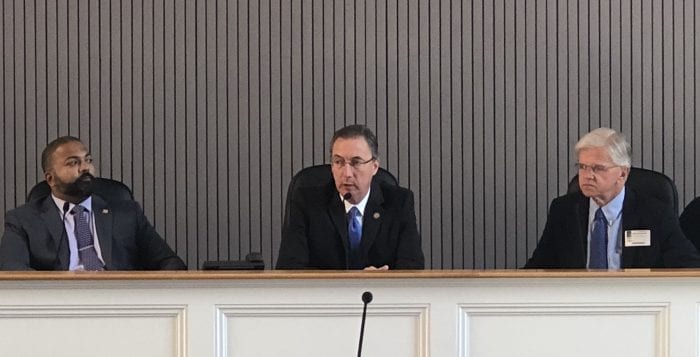Incumbent Susan Berland and challenger Hector Gavilla are vying for Suffolk County’s 16th Legislative District seat. Berland of Dix Hills is the Democratic candidate and has served on the Legislature for the past two years. She served on the Huntington Town Council as a councilwoman for more than 16 years prior to being elected county lawmaker.
Republican hopeful Hector Gavilla is seeking political office for the first time. In 2017, he ran an unsuccessful campaign for the 16th District seat which he lost to Berland. Gavilla has been a licensed real estate broker since 2003 and has run Commack-based Long Island Professional Realty since 2010.
The candidates are concerned with the future of the red-light camera program, the county financial situation, affordable housing and public safety.
Red-light camera program:
The incumbent says she believes red-light cameras save lives.
“People need to stop at a red light, they shouldn’t run through it and stop appropriately,” Berland said. “If people did that then you wouldn’t have the ‘money grab’ argument because they wouldn’t be paying the fines for them.”
Berland said there is a need for improvements in the program. She proposed looking at individual camera locations and potentially moving cameras to other problem areas.
The incumbent also said they want to make sure they can oversee the placement of cameras once they get a new contractor.
Gavilla disagreed saying the red-light camera program is a scam. He argued that the cameras are placed disproportionally in low-income areas.
“The county has discriminated by putting red-light cameras in low income communities,” he said. “There are none in the affluent areas [on the Island].”
Though he admitted that if someone runs a red-light they deserve a ticket.
Suffolk’s financial future:
The county’s finances have been one of the main topics of discussion in this year’s election season. According to a recent state comptroller report, Suffolk was under the most severe fiscal stress of any county in 2018 for the second year in a row. Suffolk had an operating deficit of about $26.5 million in 2018 and a general fund balance deficit of $285 million.
Gavilla said the county is spending money it doesn’t have.
“The total [deficit] amount depends on who you speak to,” he said.
If elected, the challenger would get rid of certain special taxes and fees. He would also look to consolidating services and making cuts in some departments.
“We need to cut expenditures, we can do that very easily by going to department heads and employees and incentivizing them to find ways to cut their fees,” Gavilla said.
Berland said when Bellone was elected to office, the county was $500 million dollars in debt.
“There hasn’t been an increase in the property tax line and we have kept within the 2 percent cap,” she said.
Berland said they are continuing to provide the services residents need, while acknowledging that the county has cut numerous government job position in the last few years.
Affordable housing on Long Island/Town of Huntington:
The county legislator said there is a need to find affordable housing for everyone.
“We need to be able to provide affordable housing, you have these [housing] developments built and then 20 to 30 years later it goes to market rate,” Berland said.
The incumbent looked to the recent Ronkonkoma Hub project as a way they could provide affordable housing as well as keep working families and young people on the Island.
Berland said she supports continued economic development in the town and giving more resources to schools.
The challenger on the other hand would look to bring back high paying jobs to the area.
Gavilla said he wants to bring back Fortune 500 companies, mentioning that his own father worked for a subsidiary of Grumman when he was young. He also said he would work with state lawmakers to assist in bringing those jobs here.
In addition, Gavilla said there is a tax problem that needs to be fixed.
“Property taxes are too high and that affects everything,” he said. “ You have to keep business owners here.”
Public safety (opioids/vaping/gang violence):
Gavilla said while visiting homes throughout the area people are happy that federal government officials are assisting in the fight against MS-13.
“I’ve visited close to 5,000 homes … the Hispanic communities are happy the feds are involved,” he said.
Gavilla said there is a need for increased police presence as he believes more can be done on the opioid epidemic as well.
According to him, the Hispanic communities are against making parts of Suffolk County as sanctuary areas, saying “they want the bad guys out.”
Berland agreed with Gavilla that more can be done with MS-13, but said the Suffolk Police Department is doing a good job.
The incumbent said in terms of immigration, people that are committing crimes should be deported.
Berland supports banning vaping in the county, saying it has created “a whole new generation of kids smoking.”
“We also need to crack down on the sale of opioids and increase Narcan training,” she said.

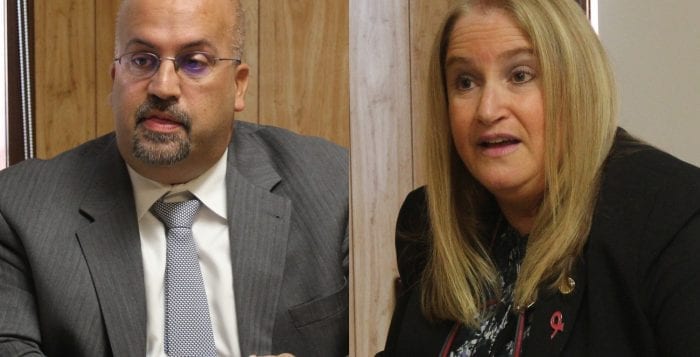


 Joan Cergol
Joan Cergol
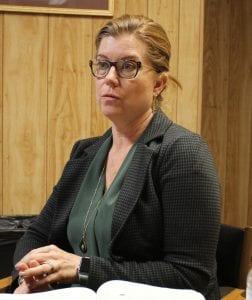 Kathleen Cleary
Kathleen Cleary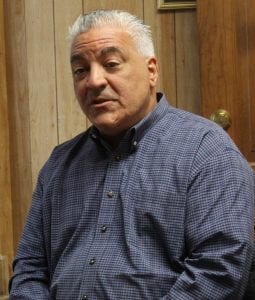 Andre Sorrentino
Andre Sorrentino

